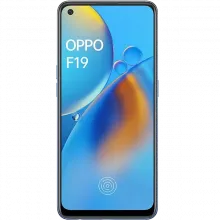
The Oppo F19 is a sleek and feature-packed smartphone that offers a compelling combination of style, performance, and affordability. With its slim design and premium build quality, it exudes elegance and sophistication.
The F19 boasts a vibrant and immersive display, featuring a 6.43-inch AMOLED panel with Full HD+ resolution. The screen offers crisp visuals, vibrant colors, and deep blacks, providing an enjoyable viewing experience for multimedia content and gaming.
Equipped with a powerful Qualcomm Snapdragon processor and ample RAM, the F19 delivers smooth and responsive performance. Users can multitask effortlessly, run demanding apps, and enjoy lag-free gaming sessions.
One of the standout features of the Oppo F19 is its impressive camera setup. It sports a triple rear camera system, including a 48-megapixel main sensor, an 8-megapixel ultra-wide-angle lens, and a 2-megapixel depth sensor. This versatile camera setup allows users to capture stunning photos with excellent detail and vibrant colors. Additionally, the device offers a range of camera features and modes, including night mode and AI scene recognition, to enhance the photography experience.
Step 1 — Download and extract the Android USB Driver to your PC.
Step 2 — Click Start (Windows) -> Control Panel -> Device Manager (Select Device Manager).
Step 3 — On the Device Manager window find and click on computer name to select Add legacy hardware.
Step 4 — Select Next
Step 5 — Selext Install the hardware that I manually select from a list (Advanced), and click the Next
Step 6 — Select Show All Devices afterward click Next button again.
Step 7 — Click the Have Disk button.
Step 8 — Click Browse button to find the extracted Android ADB Driver -> android_winusb.inf and click on Open.
Step 9 — Click OK.
Step 10 — Now select the Android ADB Interface -> click Next button.
Step 11 — Click Next button again.
Step 12 — Windows Security box will appear, to confirm whether you really want to install the Android USB Driver, so just choose the Install this driver software anyway.
Step 13 — Once you clicked the Finish button, then repeat from step 2 to choose Android Composite ADB Interface.
Step 14 - Done.